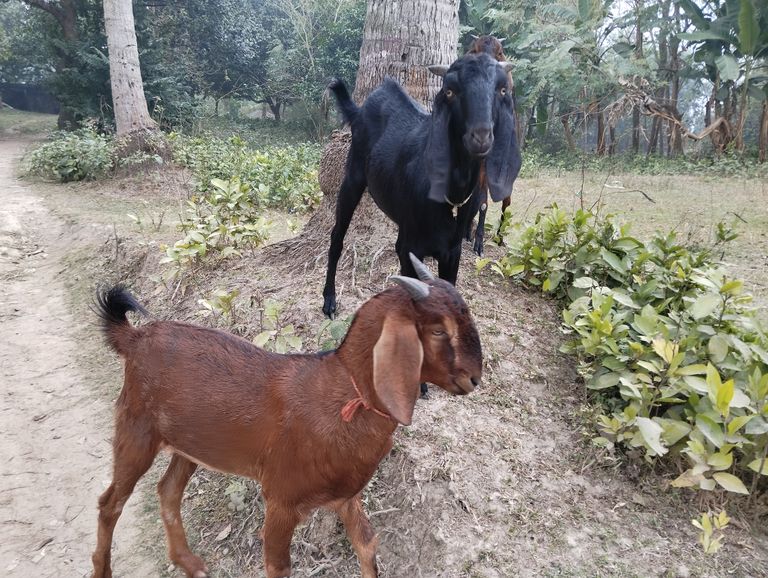
Black Bengal Goat Farming A Profitable Venture.
Black Bengal goats are a highly productive and profitable breed known for their adaptability, high fertility, and superior meat and skin quality. Originating from Bangladesh and eastern India, these goats are an excellent choice for small-scale and commercial farming. This blog provides a comprehensive guide to Black Bengal goat farming, including benefits, management, feeding, breeding, and marketing strategies.
- Why Choose Black Bengal Goat Farming?
Black Bengal goats are widely preferred due to their numerous advantages:
High Fertility Rate: These goats have a short kidding interval, producing 2-3 kids per birth.
Adaptability: They thrive in various climatic conditions, requiring minimal care.
Superior Meat Quality: Their meat is lean, tender, and in high demand.
Valuable Skin: The goat skin is of premium quality, used in the leather industry.
Low Feed Requirements: They can survive on grass, leaves, and kitchen waste, reducing feeding costs.
Quick Maturity: Black Bengal goats mature faster than many other breeds, making them ideal for commercial farming.
- Setting Up a Black Bengal Goat Farm
A. Selecting a Suitable Location
A well-drained, elevated area is ideal to prevent waterlogging and ensure a hygienic environment. Access to clean water and fresh fodder is crucial.
B. Constructing a Goat Shelter
Build a raised, well-ventilated, and dry shelter to protect goats from harsh weather.
Use bamboo, wood, or concrete materials for durability.
Maintain separate spaces for pregnant does, kids, and breeding bucks.
Ensure proper drainage and regular cleaning to prevent diseases.
- Feeding and Nutrition
A. Natural and Supplementary Feeds
Green Fodder: Napier grass, cowpea, and subabul.
Dry Fodder: Hay and straw during dry seasons.
Concentrates: Grains, bran, and pulses enhance growth and milk production.
Minerals and Vitamins: Provide salt licks and mineral mixtures for balanced nutrition.
B. Water and Feeding Schedule
Ensure a clean and fresh water supply.
Feed twice daily with a balanced diet for optimal growth and reproduction.
- Breeding and Reproduction
A. Breeding Practices
Natural Mating: Keep one healthy buck for every 20 does.
Artificial Insemination: Used in some commercial farms to improve genetic traits.
B. Pregnancy and Kidding
Gestation lasts about 145–150 days.
Provide extra nutrition to pregnant does.
Assist during kidding if necessary and ensure newborn kids receive colostrum.
- Health Management
A. Common Diseases and Prevention
PPR (Peste des Petits Ruminants): Vaccinate regularly.
Foot and Mouth Disease: Maintain hygiene and vaccinate periodically.
Worm Infestation: Deworm goats every 3–4 months.
Skin Diseases: Use antiseptics and maintain a clean shelter.
B. Routine Health Checks
Regularly inspect goats for signs of illness.
Consult a veterinarian for vaccination schedules.
- Marketing and Profitability
A. Market Demand
High demand for Black Bengal goat meat, milk, and skin in local and international markets.
Meat prices range between $5–$10 per kg (varies by location).
Goat leather is used in luxury goods, adding to profitability.
B. Selling Strategies
Direct selling to local markets and butchers.
Online marketing for live goat sales.
Supplying to restaurants, hotels, and export markets.
- Conclusion
Black Bengal goat farming is a lucrative and sustainable business. With proper management, feeding, health care, and marketing strategies, farmers can achieve significant profits. Whether you are a beginner or an experienced farmer, investing in Black Bengal goats can be a game-changer in the livestock industry. Would you like specific advice on starting your own Black Bengal goat farm? Let me know in the comments.
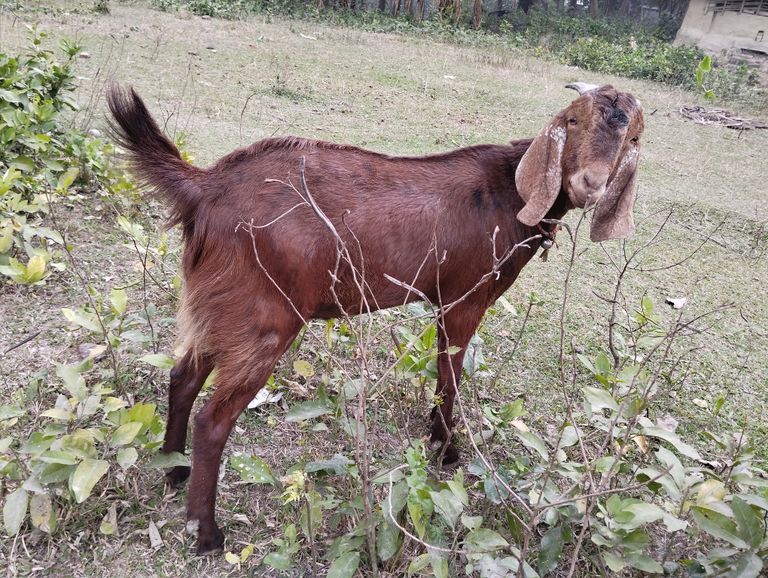
Health Benefits of Black Bengal Goat Meat
Black Bengal goat is a native breed of Bangladesh, widely known for its superior meat quality. The meat of this goat is highly nutritious and offers various health benefits. In this blog, we will explore the numerous advantages of consuming Black Bengal goat meat, its nutritional composition, and why it is considered a healthy choice.
Nutritional Value of Black Bengal Goat Meat
Black Bengal goat meat is packed with essential nutrients that contribute to overall health. Some of its key nutritional components include:
High-Quality Protein – Goat meat is an excellent source of protein, which is crucial for muscle growth, repair, and overall body functions.
Low Fat Content – Compared to other red meats, Black Bengal goat meat contains less fat, making it a healthier option.
Rich in Iron – This meat provides a good amount of iron, which helps prevent anemia and boosts blood circulation.
Low Cholesterol – The cholesterol level in goat meat is lower than beef and pork, making it suitable for heart health.
Contains Essential Vitamins and Minerals – It is a rich source of vitamins B12, B6, and minerals like zinc, phosphorus, and selenium, which support immune function and overall well-being.
Health Benefits of Black Bengal Goat Meat
- Supports Muscle Growth and Strength
Goat meat is an excellent source of lean protein, which is necessary for building and repairing muscles. It is highly beneficial for athletes, bodybuilders, and individuals recovering from injuries.
- Good for Heart Health
Unlike beef and pork, Black Bengal goat meat contains less saturated fat and cholesterol. It is rich in unsaturated fats, which help reduce the risk of heart disease and maintain healthy cholesterol levels.
- Helps in Anemia Prevention
The high iron content in goat meat helps increase hemoglobin levels, preventing anemia. This is especially beneficial for women, pregnant mothers, and individuals with low blood iron levels.
- Boosts Immunity
Black Bengal goat meat is packed with essential vitamins and minerals like zinc and selenium, which strengthen the immune system and protect against infections.
- Aids in Weight Management
Since goat meat contains lower fat and calories than beef and pork, it is a great option for those looking to manage their weight while still getting enough protein.
- Supports Brain Health
The presence of vitamin B12 in goat meat helps improve brain function, memory, and nerve health. Regular consumption may also help reduce the risk of neurological disorders.
- Beneficial for Pregnant Women
The essential nutrients in Black Bengal goat meat support fetal growth and development, making it a healthy choice for pregnant women. It also helps prevent iron deficiency during pregnancy.
- Improves Bone Health
This meat is rich in calcium, phosphorus, and zinc, which are crucial for maintaining strong bones and preventing conditions like osteoporosis.
- Helps in Digestion
Unlike fatty meats, goat meat is easy to digest due to its low fat content. It also contains amino acids that support healthy digestion.
- Reduces Inflammation
Goat meat contains anti-inflammatory properties that help reduce inflammation in the body, benefiting individuals with arthritis or other inflammatory conditions.
Why Choose Black Bengal Goat Meat Over Other Red Meats?
Better Taste and Tenderness – Black Bengal goat meat is known for its superior taste and tenderness compared to other goat breeds.
Higher Nutritional Value – It has more nutrients per serving, making it a healthier option.
Lower in Cholesterol and Fat – Compared to beef, lamb, and pork, it is a heart-friendly alternative.
Ethically Raised – Black Bengal goats are usually raised in natural, free-range environments, ensuring better meat quality.
How to Include Black Bengal Goat Meat in Your Diet
You can enjoy Black Bengal goat meat in various ways, including:
Grilled or Roasted – A delicious and healthy way to consume lean meat.
Curries and Stews – Traditional recipes enhance the flavor and nutritional value.
Soups and Broths – A nutritious option for boosting immunity.
Barbecue or Kebabs – A tasty protein-rich meal option.
Final Thoughts
Black Bengal goat meat is a highly nutritious and delicious choice for individuals seeking a healthy and protein-rich diet. With its numerous health benefits, including heart health, muscle growth, immunity boost, and weight management, it is an excellent alternative to other red meats. Whether you are looking to improve your overall well-being or simply enjoy a tasty meal, Black Bengal goat meat is a great option to consider. Would you like any specific recipes or cooking tips for Black Bengal goat meat? Let me know.
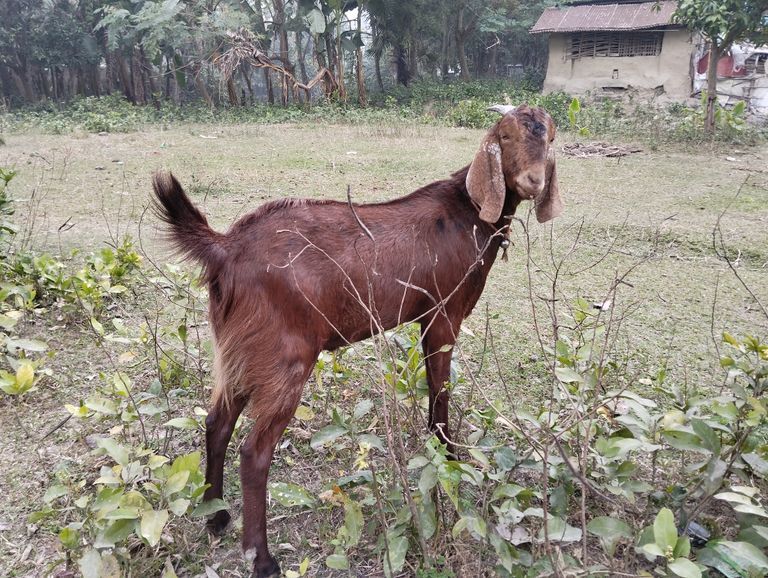
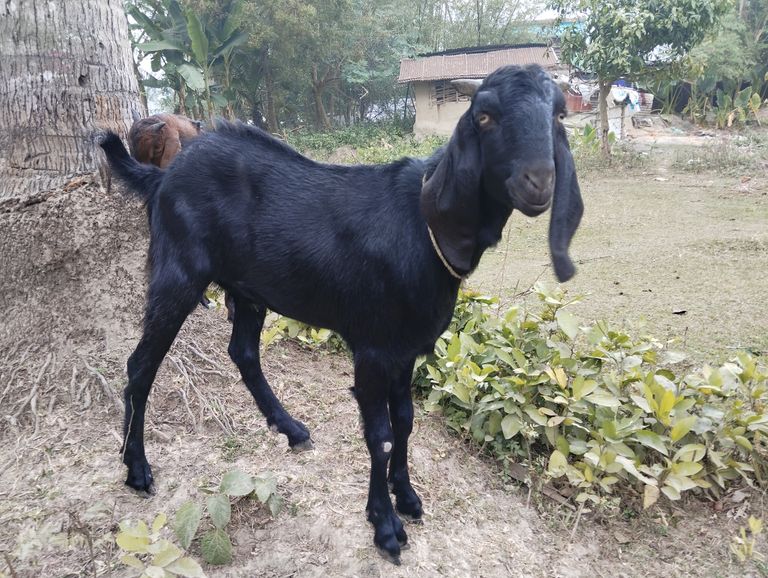
Marketing of Black Bengal Goats: A Comprehensive Guide
The Black Bengal goat is one of the most popular and profitable goat breeds in Bangladesh, India, and other South Asian countries. Known for its high-quality meat, superior fertility, and adaptability to harsh environments, this breed plays a crucial role in rural economies. Efficient marketing and commercialization of Black Bengal goats can significantly increase profitability for farmers and traders. This blog provides a detailed guide on how to market Black Bengal goats effectively.
- Understanding the Demand for Black Bengal Goats
Before entering the market, it is essential to understand the demand and value of Black Bengal goats. These goats are primarily raised for:
Meat production: Black Bengal goat meat is highly preferred due to its tenderness and unique flavor.
Leather industry: The fine-quality skin is used to produce premium leather products.
Breeding purposes: Many farmers buy them for genetic improvement and commercial farming.
Key Market Trends
High demand during festivals: Eid-ul-Adha, Puja, and other celebrations significantly increase goat sales.
Rising urban consumption: Cities have an increasing demand for high-quality organic meat.
Export potential: Black Bengal goat meat and leather have great export value in international markets.
- Choosing the Right Marketing Channels
There are multiple ways to sell Black Bengal goats. Choosing the right marketing channel ensures better prices and faster sales.
A. Local Livestock Markets (Haat)
Traditional livestock markets are still the most common selling point.
Farmers can sell directly to butchers, traders, and individual buyers.
Prices vary based on demand, season, and goat size.
B. Direct Farm Selling
Selling goats directly from the farm to consumers ensures better profit margins.
Local advertisements and word-of-mouth marketing can attract buyers.
C. Online Marketplaces & Social Media
Platforms like Facebook Marketplace, WhatsApp groups, and agricultural websites are growing in popularity.
Farmers can list goats for sale with photos, weight details, and pricing.
Online marketing reduces middlemen costs and increases profits.
D. Contract Farming & Wholesale Selling
Large meat processing companies, restaurants, and hotels require a steady supply of goat meat.
Farmers can enter into contract farming agreements with meat companies.
This ensures stable income and long-term business relationships.
E. Export Market
There is an increasing demand for Black Bengal goat meat and leather in the Middle East, Europe, and other regions.
Farmers can collaborate with export companies or goat meat processors to access these markets.
- Pricing Strategy for Maximum Profit
Setting the right price for Black Bengal goats is crucial for profitability. Pricing depends on:
Factors Affecting Price
✔ Weight & Health: Healthy goats with higher weight fetch better prices.
✔ Age & Breed Purity: Young, purebred Black Bengal goats have more value.
✔ Seasonal Demand: Prices rise during religious festivals.
✔ Market Trends: Understanding local and global trends helps in pricing competitively.
Pricing Strategies
✅ Cost-Plus Pricing: Calculate production costs (feed, medicine, shelter) and add a profit margin.
✅ Market-Based Pricing: Analyze competitor prices and set a competitive rate.
✅ Dynamic Pricing: Increase prices during high-demand seasons.
- Effective Marketing Strategies for Black Bengal Goats
Marketing plays a vital role in ensuring faster sales and higher profits. Here are some effective marketing techniques:
A. Branding & Promotion
Promote "organic, grass-fed, and chemical-free" goat meat to attract premium buyers.
Use labels like "Pure Black Bengal Breed" to differentiate from mixed breeds.
Offer certification if applicable (e.g., organic meat certification).
B. Social Media & Online Ads
Post high-quality images & videos of goats on Facebook, Instagram, YouTube.
Run paid advertisements on social media for better reach.
Engage with customers via WhatsApp & Messenger for inquiries.
C. Influencer & Community Marketing
Collaborate with food bloggers, chefs, and livestock influencers to promote goat meat.
Build a loyal customer base through community groups and word-of-mouth marketing.
D. Partnership with Local Butchers & Restaurants
Sell directly to butchers, ensuring bulk orders and regular income.
Partner with organic restaurants and premium meat suppliers.
E. Customer Loyalty Programs
Offer discounts for bulk buyers.
Provide membership programs for frequent customers.
- Ensuring Quality for Better Market Value
To attract high-paying customers, farmers must ensure:
✅ Proper Feeding & Nutrition: High-quality food improves meat quality.
✅ Disease Control: Regular vaccinations and veterinary care reduce losses.
✅ Weight Management: Healthy goats should have an ideal weight for maximum market value.
✅ Hygienic Farming Practices: Clean and well-maintained farms attract premium buyers.
- Government & NGO Support for Goat Farming
Many governments and NGOs provide financial aid, training, and support for Black Bengal goat farming. Farmers should:
Apply for loans & grants for goat farming projects.
Participate in training programs for modern farming techniques.
Join cooperative groups to benefit from group marketing and subsidies.
- Challenges in Marketing Black Bengal Goats & Solutions.
The Black Bengal goat market is expanding, and farmers can maximize profits with smart marketing strategies. By leveraging local markets, online platforms, direct selling, and branding, goat farmers can ensure sustainable income. Investing in quality control, pricing strategy, and customer engagement will lead to long-term success.
If you are a Black Bengal goat farmer or planning to start, follow these marketing strategies to enhance your business growth. With proper planning, you can turn your goat farming venture into a profitable business!
Have Questions?
Drop your queries in the comments, and let's discuss how you can scale your Black Bengal goat farming business.
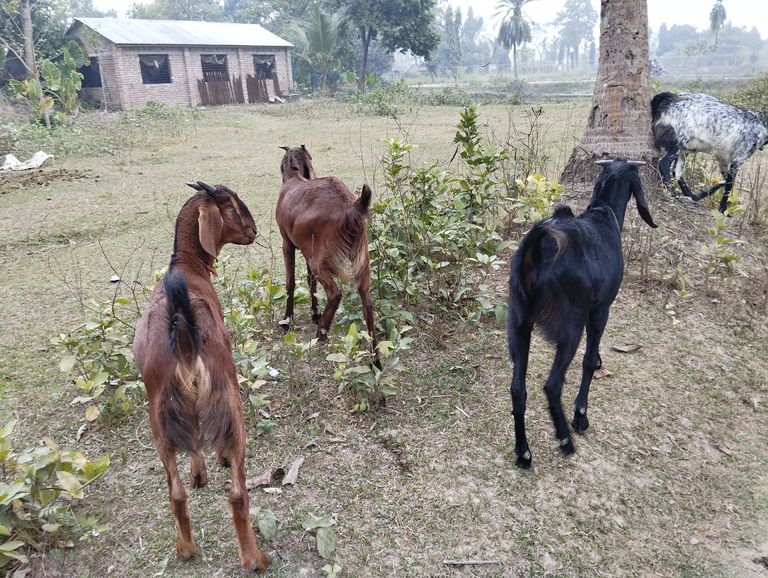
Marketing of Black Bengal Goats: A Comprehensive Guide
The Black Bengal goat is one of the most popular and profitable goat breeds in Bangladesh, India, and other South Asian countries. Known for its high-quality meat, superior fertility, and adaptability to harsh environments, this breed plays a crucial role in rural economies. Efficient marketing and commercialization of Black Bengal goats can significantly increase profitability for farmers and traders. This blog provides a detailed guide on how to market Black Bengal goats effectively.
- Understanding the Demand for Black Bengal Goats
Before entering the market, it is essential to understand the demand and value of Black Bengal goats. These goats are primarily raised for:
Meat production: Black Bengal goat meat is highly preferred due to its tenderness and unique flavor.
Leather industry: The fine-quality skin is used to produce premium leather products.
Breeding purposes: Many farmers buy them for genetic improvement and commercial farming.
Key Market Trends
High demand during festivals: Eid-ul-Adha, Puja, and other celebrations significantly increase goat sales.
Rising urban consumption: Cities have an increasing demand for high-quality organic meat.
Export potential: Black Bengal goat meat and leather have great export value in international markets.
- Choosing the Right Marketing Channels
There are multiple ways to sell Black Bengal goats. Choosing the right marketing channel ensures better prices and faster sales.
A. Local Livestock Markets (Haat)
Traditional livestock markets are still the most common selling point.
Farmers can sell directly to butchers, traders, and individual buyers.
Prices vary based on demand, season, and goat size.
B. Direct Farm Selling
Selling goats directly from the farm to consumers ensures better profit margins.
Local advertisements and word-of-mouth marketing can attract buyers.
C. Online Marketplaces & Social Media
Platforms like Facebook Marketplace, WhatsApp groups, and agricultural websites are growing in popularity.
Farmers can list goats for sale with photos, weight details, and pricing.
Online marketing reduces middlemen costs and increases profits.
D. Contract Farming & Wholesale Selling
Large meat processing companies, restaurants, and hotels require a steady supply of goat meat.
Farmers can enter into contract farming agreements with meat companies.
This ensures stable income and long-term business relationships.
E. Export Market
There is an increasing demand for Black Bengal goat meat and leather in the Middle East, Europe, and other regions.
Farmers can collaborate with export companies or goat meat processors to access these markets.
- Pricing Strategy for Maximum Profit
Setting the right price for Black Bengal goats is crucial for profitability. Pricing depends on:
Factors Affecting Price
✔ Weight & Health: Healthy goats with higher weight fetch better prices.
✔ Age & Breed Purity: Young, purebred Black Bengal goats have more value.
✔ Seasonal Demand: Prices rise during religious festivals.
✔ Market Trends: Understanding local and global trends helps in pricing competitively.
Pricing Strategies
✅ Cost-Plus Pricing: Calculate production costs (feed, medicine, shelter) and add a profit margin.
✅ Market-Based Pricing: Analyze competitor prices and set a competitive rate.
✅ Dynamic Pricing: Increase prices during high-demand seasons.
- Effective Marketing Strategies for Black Bengal Goats
Marketing plays a vital role in ensuring faster sales and higher profits. Here are some effective marketing techniques:
A. Branding & Promotion
Promote "organic, grass-fed, and chemical-free" goat meat to attract premium buyers.
Use labels like "Pure Black Bengal Breed" to differentiate from mixed breeds.
Offer certification if applicable (e.g., organic meat certification).
B. Social Media & Online Ads
Post high-quality images & videos of goats on Facebook, Instagram, YouTube.
Run paid advertisements on social media for better reach.
Engage with customers via WhatsApp & Messenger for inquiries.
C. Influencer & Community Marketing
Collaborate with food bloggers, chefs, and livestock influencers to promote goat meat.
Build a loyal customer base through community groups and word-of-mouth marketing.
D. Partnership with Local Butchers & Restaurants
Sell directly to butchers, ensuring bulk orders and regular income.
Partner with organic restaurants and premium meat suppliers.